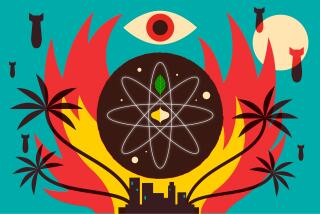Martians of the World, Unite! : NIGHTSHADE <i> by Jack Butler (Atlantic Monthly Press: $17.95; 272 pp.) </i>
- Share via
“Nightshade” is a difficult novel in the best sense of the term: both the writing and the themes demand the reader’s full attention, and then reward that effort with a vision of a future that challenges some of our basic assumptions about reality. In this, Butler’s work most clearly resembles that of Samuel Delany, though Butler approaches his story from a point of view that is the complete opposite of Delany’s. Both writers share a concern for and a love of language; both are ambitious enough to make their science fiction an explicit reflection of today’s society.
The faults in “Nightshade” are the faults of ambition. There is so much here, so much complexity in the societies and characters Butler has created, that the novel seems too short to do full justice to it all. This is the story of John Shade, a self-confessed vampire, who has, after a long and eventful undeath begun during the American Revolution, become a rancher in the colony of Hellas on a now partially terra - formed Mars. Even in the gaudy frontier society of Hellas, however, a vampire is something a little outre , and in any case, as Mars becomes more settled, the frontier and the mentality it has created are changing into something quite different. Into this situation come two mysterious visitors, an old man and an artificial intelligence, and all too quickly Shade finds himself manipulated into becoming the leader of a rebellion of the underclasses--media-fed “zoomers,” artificially enhanced janglers, and Martian ranchers--against the various powers that control Mars.
Any one of Butler’s subplots and sci-tech ideas would have--and in some cases have--provided lesser writers with sufficient material for an entire novel, and it is very much to Butler’s credit that he is able to integrate the wildly disparate societies, and people, and themes, as well as he has. The very richness of the setting, however, is occasionally confusing--for example, not all the new words Butler coins, the Martian slang and dialects, are clear from context, and while the glossary at the end of the novel defines most of these terms, I find the device a little jarring. This overabundance of material extends to the complicated plot as well, so that at times the physical action seems to lag while Butler explores the relationships among the characters that provide the emotional meat of the story. Part of this lag is caused by Butler’s choice of style--a first person narrative addressed to a putative reader--which, by its Brechtian insistence on displaying the stage machinery, makes it very hard to put all of the pieces back into a coherent whole. This stylistic choice weakens the ending, as the resolution of the important parts of the plot takes place in a question-and-answer afterword, which is less satisfying than it could have been. I had been made to care about these characters, and about Mars and its societies, too much so for this distanced answer to be sufficient.
And I did end up caring about this world and its people. Butler’s Mars is an absolute tour de force, combining the best elements of Cyberpunk and traditional science fiction to create a world at once fascinating and terrifyingly plausible. His linguistic games--the strongest part of a strong novel--are reminiscent of the best of Delany, and here Butler makes his most dangerous and disturbing choices, particularly in his use of black dialect and culture. John Shade is like no vampire I’ve ever seen in fiction, while still conforming to the demands of the myth--and on top of that Butler throws away an explanation of vampire origins that most writers would have hoarded to form the centerpiece of an entire novel.
“Nightshade” is difficult and demanding, but also a tremendously exciting work. The choice of an effectively immortal narrator, who has seen the frontiers of our historical past, gives a perspective to the physical, cultural, and technological frontiers of Butler’s Mars that is lacking in all too much of contemporary fiction. I could happily have read another hundred pages of “Nightshade”; failing that, I eagerly await Butler’s next novel.
More to Read
Sign up for our Book Club newsletter
Get the latest news, events and more from the Los Angeles Times Book Club, and help us get L.A. reading and talking.
You may occasionally receive promotional content from the Los Angeles Times.







